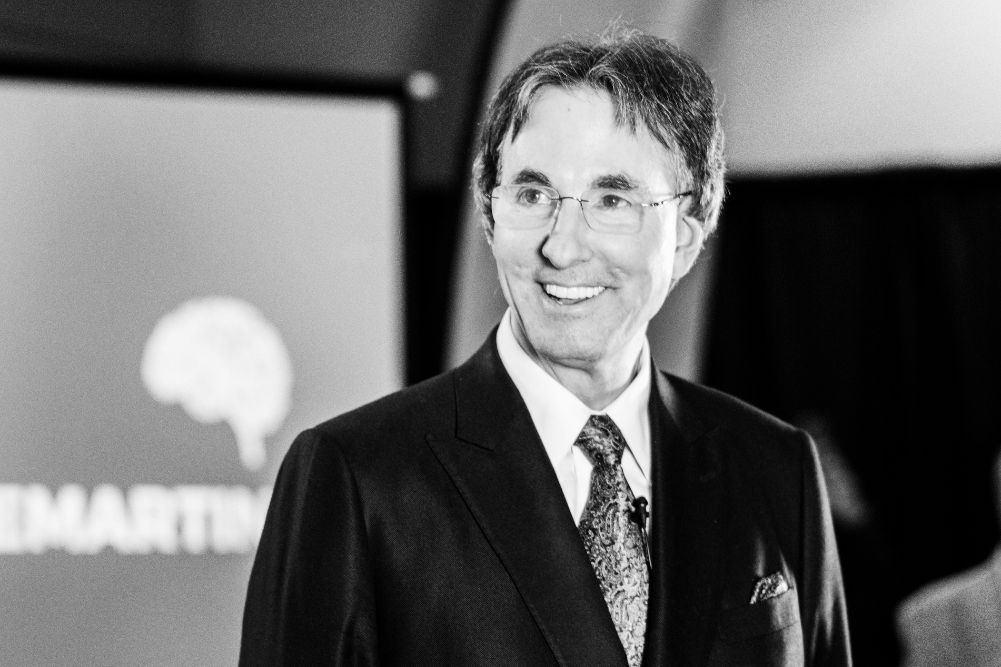Meet explorer Tim Cope and learn his wisdom
Trying to pin down award-winning Aussie adventurer, author, filmmaker and motivational speaker Tim Cope is akin to catching a falling leaf. Sitting cross-legged in a city park enjoying friendly licks from his dog Tigon, we have barely begun our first interview before he is summoned to the stage in front of an audience of hundreds at the Happiness & Its Causes conference in Sydney. Afterward I wait for the book-signing queue to diminish but, like a magic pudding, it grows longer instead.
When I do finally catch him on the phone some time later, an hour after our scheduled appointment, he is apologetic. His regular three-hour walk up a forested mountain near his home in Victoria’s Kiewa Valley usually doubles as his phone appointment time but rain had caught him unawares. Perhaps in proof, Cope texts a photo of the forest minutes before the storm rolled in, mist swirling through the snow gums like spirits, Tigon’s large black frame an inkblot in the foreground.
It’s worth the wait. Despite being on the tail end of a whirlwind global speaking tour to promote On the Trail of Genghis Khan: An Epic Journey Through the Land of the Nomads, the book Cope wrote about his three-year horseback expedition through Asia, he speaks with the freshness of one recently returned and eager to share the stories.
“Head west and when the people start speaking French you’ve gone too far,” he laughs in memory of one of the initial directional markers he was given. While true, it’s a statement that barely hints at the sheer distance and mountain-high challenges Cope faced in undertaking his modern-day pilgrimage.
“An adventure can open up a unique path into the fabric of a country; its people, culture and landscapes."
Inspired by the extraordinary life of the nomads of the Eurasian steppe, it was in 2004 that Cope set out on a journey tracing the tracks of Genghis Khan and his tribe of Mongols as they created the largest contiguous land empire in history in the 13th century. To achieve this he travelled on horseback across the entire length of the steppe, from Karakorum, the ancient capital of Mongolia, through Kazakhstan, Russia, Crimea and the Ukraine to the Danube River in Hungary. Designed to take 18 months, the journey took over three years — and more blood, sweat and tears than Cope imagined possible.

While a book of his adventures was always planned, it sounds as if Cope had little inkling how deeply the story would capture the imaginations of audiences worldwide. As well as winning the Banff Mountain Book Festival Grand Prize for his Bloomsbury-published tome, Cope and his nomadic wanderings were also the subject of an award-winning documentary series titled The Trail of Genghis Khan which he produced for ARTE in Europe and the ABC. His speaking tour has taken him to all four corners of the globe with crowds turning up to hear and see firsthand his tales of adventure, discovery and survival and how they have shaped his philosophy to life.
On the trail
The media storm is a far cry from Cope’s spacious days on the steppe with nothing but Tigon, his three horses and the vast horizon for company. Perhaps because of this juxtaposition, the motivation that propelled him out there is still palpable: “I just really wanted to pare life back to its essentials; to explore and discover; to steep myself in the spirit of the nomadic way of life.”
Like many big dreams and unlikely heroes, Cope’s journey starts with an almost comical obstacle. “When I arrived in Mongolia the only problem was I couldn’t ride a horse. I was petrified.”
Scared but determined, Cope set off with his then girlfriend Kathrin, who rode with him for the initial weeks. Her company was a welcome comfort after the humbling he received days into the adventure: “In the middle of the night on day five my horses disappeared.”
The bell that he had been recommended to hang around the horses necks in order to help locate them was also the marker that led horse thieves directly to their whereabouts. Finding them the next morning in the possession of a local nomad, Cope looks back in hindsight at the valuable lesson he was given.
“Two days before Christmas, my tent was falling apart, the GPS was malfunctioning under the extreme low temperatures and I was worried. I limped into the most depressing town imaginable and found shelter with two alcoholics.”
“Rather than staying with the local people we had been camping alone. The nomad told me, ‘A man on the steppe is as narrow as a finger, and a man on the steppe with friends is as wide as the steppe.’ It was a wakeup call to break out of my dream world and start learning the customs of the land and its people.
Cope chuckles, “He also told me that if people are trying to steal your horse on the steppe then it’s a compliment. And if they can do it then they’re better than you and deserve the horse.”
While it wouldn’t be his last encounter with horse thieves, Cope started accepting the hospitality of the nomadic people, bedding down inside their woollen yurts at night, drinking the soured milk from their camels and goats and listening to their stories.

From horse-riding novice to spending months in the saddle, Cope learnt to fend off wolves and would-be horse thieves, temperatures ranging from -50 to +54 degrees Celsius and a constant struggle to find grass and water for his caravan. In the searing summer he travelled only at night with the addition of a camel, while in winter he struggled to Travel in the few daylight hours when the temperature rose marginally. At one stage he was stuck in no-man’s-land between Kazakhstan and Russia in a bureaucratic battle that eventually lasted almost six weeks. A mix of diplomacy and perseverance helped him through this and over many other hurdles and as a result Cope’s caravan still included two horses that struggled and pulled Cope through from the distant Altai.
It was Kazakhstan that truly put Cope to the test: “Kazakhstan had borne the brunt of industrialisation. In the aftermath of the Soviet collapse, they had neither their traditional systems nor the Soviet system to fall back on and it was very messy.”
It was here that he was given Tigon, the puppy he thought wouldn’t survive more than a couple of weeks but ended up being the sidekick he couldn’t have done without, especially when crossing the “starving steppe”.
“Two days before Christmas, my tent was falling apart, the GPS was malfunctioning under the extreme low temperatures and I was worried. I limped into the most depressing town imaginable and found shelter with two alcoholics.”
Cooking up pigeons for dinner, Cope remembers calling home and wishing for an exit but there wasn’t one. He was forced to wait out the cold snap for over three months in the icy grey village.
“If you ever have to rush in life, rush slowly,” Cope says, reciting an old Kazakh saying. “It’s a completely different way of life. Time is known more from the rise and fall of the sun and movement of the seasons.”
In the end it was people who came to his rescue, his journey saved once again due to the hospitality of a generous villager who nursed him and his horses through the winter.
“Mountains never meet but people do,” says Cope, remembering another piece of wisdom imparted to him by one of the more than 160 families who invited him into their homes. “It’s definitely something I came to learn during my trip — that it’s our relationships in life that matter most of all.”
An adventurer is born
It was Cope’s relationship with the natural world, and his father, that sparked his passion at a young age for adventure in the outdoors.
“The life mapped out for us is so rigid and fenced in. I’ve always had a feeling that I don’t want to be a product of this society. I want to create something authentic and have ownership over my own life.”
“Growing up in a rural environment, I’d be walking along the track and spellbound by these huge grey gums. I’d keep check on every tree and where it was at. Our cousins lived in Melbourne and I couldn’t understand what they did all day in a tiny yard,” he recalls.
“My father was an outdoor educator and would take us kayaking, skiing and surfing. I remember looking out onto Bass Strait and imagining myself being this little tiny speck. I was terrified but it gripped me and I couldn’t shake thinking about it.”

A school trip to Nepal at the age of 16 ignited Cope’s fascination with traditional cultures. “I could watch people all day,” he recalls. “The stark difference in lifestyle suddenly opened up that part of my mind to possibilities and made me realise how many different approaches there are to life.”
Leaving school, he travelled extensively through Eastern Europe — including a journey across the former Yugoslavia from Bulgaria — and spent his 19th birthday in Sarajevo. In 1999, Cope returned to Australia to take up his Arts/Law degree at ANU in Canberra, a move he says felt “like death”.
“The first thing the lecturer said was, ‘The beginning of law and history marks the beginning of civilisation.’ I knew I was in the wrong place. The further from civilisation I got the more alive I felt.
“The life mapped out for us is so rigid and fenced in. I’ve always had a feeling that I don’t want to be a product of this society. I want to create something authentic and have ownership over my own life.”
Dropping out of university, Cope left to study wilderness guiding in Finland and made expeditions into the Arctic and forest regions of Russia. Russia represented the chance to explore a land of unparalleled wilderness and mystique, a place so unknown to him in Australia that it had been like a myth. The people also intrigued him. Their openness, spontaneous energy and friendliness inspired him to begin learning the language. In late 1999, he embarked on a cycling adventure across Russia to Beijing with a friend, a trip that planted the seed to return to the steppe on more traditional transport: horseback.
Lessons from the steppe
Although he travelled mostly alone, the message Cope returned with is about the need for communities to preserve traditional ways of living.
“What struck me is the role that traditional knowledge and culture can play in bridging that gap between understanding the ecology and environment and the great danger when a culture modernises quickly, like what is happening now in Mongolia with the mining boom,” he says.
“It’s incredibly valuable to extend ourselves; to look at the world [through] another culture’s eyes in order to help us understand and tackle the problems and flaws of our own society."
“The risk is that they throw the baby out with the bathwater. Traditional knowledge can be lost in the space of a generation or two. The steppe nomads are an incredible example [in] how they’ve managed to live sustainably for generations. My journey was a lot about trying to understand and communicate this relationship nomads have to their environment.”
According to Cope, the biggest lesson he learnt is the value of stepping into someone else’s shoes and opening your worldview to include other ways of living: “It’s incredibly valuable to extend ourselves; to look at the world [through] another culture’s eyes in order to help us understand and tackle the problems and flaws of our own society.
“Unless you’ve experienced being in a world where people live in harmony with their environment and acknowledge that they are part of greater web of life, it’s hard to imagine it.”
While a valuable lesson to impart on his return, it is perhaps Cope himself who offers the greatest inspiration to his readers: the courage and determination to undertake a journey of such magnitude in a world increasingly risk-averse and controlled. Like the boundless steppe he traversed step by step, Cope offers an example of a life unbounded by the normal rules; a model of what it means to be an explorer and pioneer in the 21st century.
“People often say everything has been explored — but how many languages do you speak? What do you know about what life is in Central Asia? The world is still a big place and distance hasn’t been erased over time.
“An adventure can open up a unique path into the fabric of a country; its people, culture and landscapes. It is a way of being open, intimate and embracing the unknown and unexpected. When you start doing that, the world opens up to you and anything is possible.”








